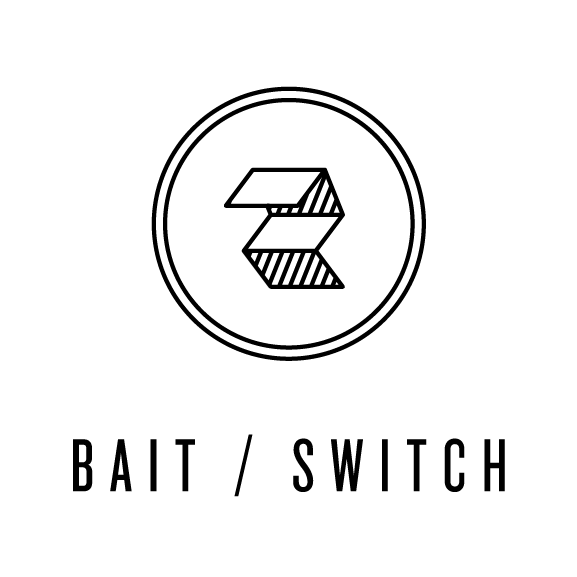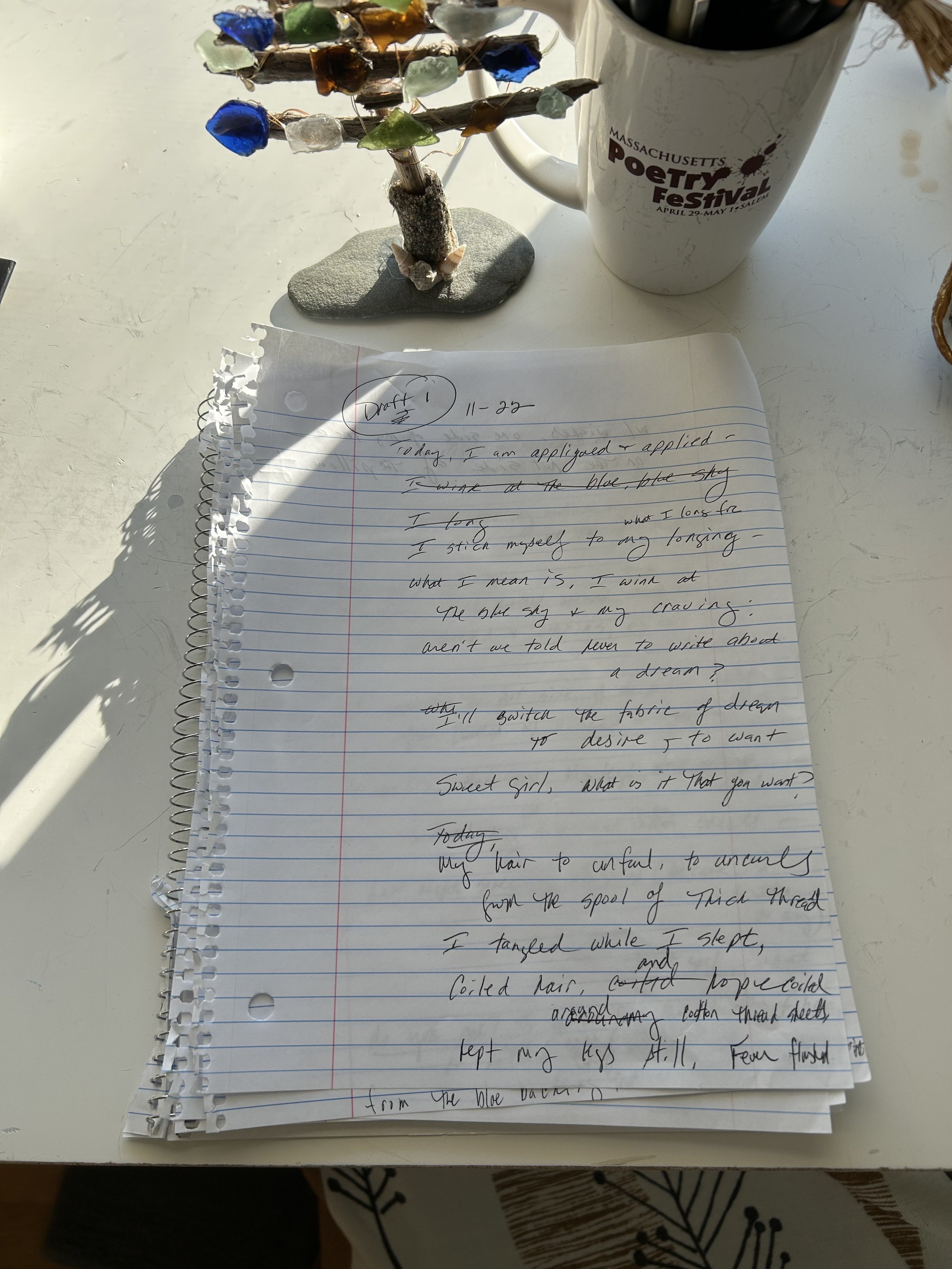Broken Sonnet/Forgotten Prayer
Jennifer Martelli
Today, I woke appliquéd and applied, stitched to my own longing.
Half fever-flushed with wishes, I woke on the hot side of my pillow.
Last I recall, something sibilant whispered, Sweet girl, what do you ask?
My hair, all knotted around thick spools of thread and bobbins, my hair curled, furled.
My legs, pinned and needled, wound around my high-count cotton sheets, my black cat.
I winked at the blue sky outside my east window, saw the ivied wall.
See, I’d forgotten to pray last night, to cast my own spell, to untangle myself
from this fabric that craves the patience of the needle’s point.
“’Crave’ is not always a great word.”
Interview by C. VanWinkle
December 7, 2024
What was the prompt that you responded to? Can you describe it for me?
It was this very interesting quilt, sort of a quirky, fun, hybrid image with words: expect, desire, aim, crave… It was fascinating. It's funny, I'm never sure how to respond to bright colors. So I showed the image to one of my good friends, the poet Cindy Veach, who is also a quilter. She's wonderful with needlework. I asked her if there’s a name for this kind of stitching or quilting, and she said it looks more like appliqué, so that was the word that stuck with me. I looked up the root of the word and in French it means “applied,” and I liked that too, I liked the wordplay.
Broken Sonnet/Forgotten Prayer in progress
I really love ekphrasis and I like responding to movies. I don't know what's going to come of it, but I’m working on this collection that's responding to the 2018 movie Suspiria. For this one scene, I could not get the poem right. You know, when you write something and you know it just isn’t there. Working with this piece really allowed me to move the idea to a different place that I really loved. I loved the artist’s words in here. Some of them have better connotations than others, you know. You have “hope” and “wish,” but then you have “expect” and “crave,” which have different dimensions to them. And I liked that the face was cut in half. It was a smile, but the eyes were a little off. As happy and kind of funny as it is, to me it also had a different side to it. But that could just be me. [laughs]
How did you actually get started? Was the word “appliqué” what moved you to start putting words on paper?
Yeah. I really appreciate that you’d said in the instructions, “This doesn’t have to be your Opus.” I don't know if this poem is finished or not, but I feel like I really got to the meat of what I was trying to say through this image, and I will be eternally grateful to you. [laughs] Yeah, it was the word “appliqué.” That became the first line: “Today, I woke appliqued and applied, stitched to my own longing.”
That was the genesis. You know how it works with writing, this could change again, it could change a million times, but that was the word. That and its origin.
Do you actually sew? There's a lot of sewing vocabulary in here.
No! I really wanted to do that to honor the piece, but I don’t. I could sew a button on or whatever, but no I don't sew at all in any creative or useful way. But I wanted to keep that as part of the poem because that’s what this piece is. It's stitched. And I love that. I love that and the creativity of needlework, of actual sewing. You know, I'm kind of blending two sources: not only the image, but the movie that I'm working from. There’s some body horror stuff going on with a needle, so…
And this face looks pretty abstract, but if it's not, then there is definitely some body horror happening.
Yeah! [laughs] I see what the artist is doing there. There's a smile and, you know, those eyes. And yet, if you really look at the eyes, they're both kind of downcast. I don’t know, it’s just interesting. And the words really fascinated me too, how the artist used all these different words that have obvious similarities, but I think have different meanings. “Crave” is not always a great word. “Long for.” That could change easily, and I liked that it added something to this.
That’s a great observation. Those things mean that you don't have what you want, right? Something’s missing.
Exactly.
How does this piece that you wrote relate to the rest of your work?
Well, I'm working on this manuscript of poems that were inspired by the 2018 movie Suspiria, the remake of the 1977 movie. And surprisingly, this piece gave voice to a section of the manuscript that I couldn't get at in a way that satisfied me. This really allowed me entrance into that.
When I think of all my work… I feel like I'm a much happier, funnier person than my poems would make one believe. But I love that idea that with just a quick turn, put the wrong word in a sentence, “crave” becomes something bad. I love that. I think that whoever made this really captured it. And again, gave me the vocabulary that fit into this project that I'm working on now.
Do you often work from movies? Is that a pretty regular source of inspiration for you?
Not to the extent that I am now. I mean, yes, I watch too many movies, so they make their way into my work a lot of times. For some reason, I started writing a few poems that responded to this movie, and then I read Dorothea Lasky's latest book called The Shining, as in the movie. It just blew me away that somebody was so bold to say, “I’m going to write about this and I don’t care if you even saw the movie.” And it’s not a retelling of the movie in poetry. It’s an ekphrastic book; it’s responding to it. And that's a much more iconic film than Suspiria. I love that idea of centering a whole collection around this one movie and just going for it. I love that.
I noticed that The Shining and Suspiria are not rom coms. Is it that suspense or horror that you find compelling?
Jenn Martelli’s workspace
Lasky wrote a great essay in Lit Hub about writing about horror. She was talking about the movie Carrie, which was one of the first movies that got her into writing. I hate using the word “catharsis” because that's completely inaccurate, but she feels that for the times we're living in, it somewhat responds to certain energies in the air. The essay is really great. It's in Lit Hub, Dorothea Lasky, and it's about horror in literature and responding to it.
And just like in her book, this collection I’m working isn’t saying, “And then Dakota Johnson walks into the dance studio and sees Tilda Swinton…” I'm not doing that; it's coming from me. Just like any sort of ekphrastic poetry, it's not really a description of what you're seeing. For me anyway, it's more about what this is doing, what it inspires. So this piece gave me the language of sewing, of needlework, of all that great stuff.
Because you don't sew, I assume you had to do some research to know how to talk about it. Do you often put much research and preparation into writing a piece?
I do, except for my most recent book. My previous two books were project-oriented, so I had to look things up! Poetry is fiction. It's internalized, but you don’t want to be wrong either, about something so easy. Again, the first thing I looked up was appliqué, and what does that really mean? That's just a great way to write poetry because poetry is language and it’s music. You get these great words sometimes that you weren't expecting. So the whole idea of “appliqué” and “application” and “applied” was really what started the poem. And I wanted to get as much of those other words in there as possible.
And the poem has to stand on its own without looking at the image or the movie. It has to work on that level. If I sent this poem out, they're not necessarily going to have this picture to go along, right? So it has to work and it has to be accurate. I love doing research because you get information and vocabulary and stories that might be useful.
Is there anything else you want to say about this experience or your process that I didn't ask about?
This was a lovely, lovely process. I really enjoyed it. It was so helpful to me in terms of giving me a portal into this section of the book that I couldn't get into. And your instructions were really good. I kind of relaxed, I said to myself, “This doesn't have to be the quintessential Jenn Martelli poem. Just work with it, see where you can go.” I have a feeling it might end up being a little bit longer. I'm not sure, though I love the sonnet form and messing around with it. I love the idea of an Italian sonnet, broken at the neck. And now it's not going to turn. [both laugh]
That's beautiful. And a very poetic way to look at it. I’m so glad you enjoyed this experience. I think a lot of people find it refreshing because the stakes are so low. No one’s expecting something in particular. It's just, “What does this make you feel like doing?”
Yeah, that's how it was. And with that sort of reassurance, I ended up making strides in something else that I was doing, so I thank you for that.
My pleasure! Okay, last question. Now that you are on this side of this process, what's your advice to a new person getting their prompt today?
I'm gonna go to the advice you gave me: have fun with it. Don't worry, this doesn't have to be THE poem that you write. Really have fun with it. And use it! If you're working on something else, use this. That's what we do with art in any form. Use it to enter another poem that you weren't able to access. I think we all know that feeling. We know when it's not getting there.
Another thing, I'm in an ekphrastic group on Facebook. I never thought of myself as an ekphrastic poet, and I still don't per se, but I've been able to generate some really, really good work. And I'm not trying to just describe the work, though that is an aspect of ekphrastic poetry. So for this one, from the first word “appliqué,” I focused on the needlework of it, and the words in the piece really helped a lot. If you can find the one thing that hooks you, you can focus on that.
Call Number: Y127VA | Y128PP.maBro
Jennifer Martelli (she/her) has received fellowships from The Virginia Center for the Creative Arts, Monson Arts, and the Massachusetts Cultural Council. Her previous collection, The Queen of Queens, won the Italian American Studies Association Book Award and was shortlisted for the Massachusetts Book Award. Her most recent poetry collection is Psychic Party Under the Bottle Tree from Lily Poetry Review Books.




